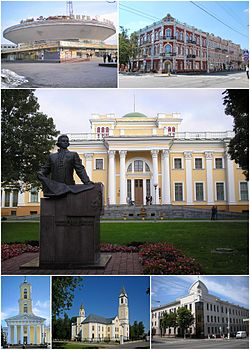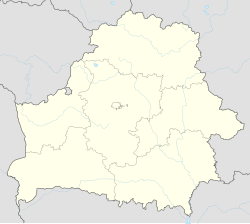Gomel, Belarus
|
Gomel Гомель |
|||
|---|---|---|---|
 |
|||
|
|||
| Location in Belarus | |||
| Coordinates: 52°26′43″N 30°59′03″E / 52.44528°N 30.98417°ECoordinates: 52°26′43″N 30°59′03″E / 52.44528°N 30.98417°E | |||
| Country |
|
||
| Voblast | Gomel Voblast | ||
| Founded | 1142 | ||
| Government | |||
| • Chairman | Petr Kirichenko | ||
| Area | |||
| • Total | 135.34 km2 (52.26 sq mi) | ||
| Elevation | 138 m (453 ft) | ||
| Population (2015) | |||
| • Total | 526,872 |
||
| • Density | 4,258.4/km2 (11,029/sq mi) | ||
| Time zone | FET (UTC+3) | ||
| Postal code | 246xx, 247xxx | ||
| Area code(s) | +375 232(2) | ||
| License plate | 3 | ||
| Website | Official website | ||
Gomel (also Homel or Homyel’;Belarusian: Го́мель, Łacinka: Homiel, pronounced [ˈɣomʲelʲ], Russian: Го́мель, pronounced [ˈɡomʲɪlʲ], Polish: Homel, Yiddish: Homl ,האָמל, Lithuanian: Gomelis) is the administrative centre of Gomel Voblast and with 526,872 inhabitants (2015 census) the second-most populous city of Belarus.
There are at least six narratives of the origin of the city’s Belarusian name. One of the more plausible is that the name is derived from the name of the stream Homeyuk, which flowed into river Sozh near the foot of the hill where the first settlement was founded. Names of other Belarusian cities are formed along these lines: for example, the name Minsk is derived from the river Menka, Polatsk from the river Palata, and Vitsebsk from the river Vitsba. In historical sources from 1142 to the 16th century, the city is mentioned as Hom', Homye, Homiy, Homey, or Homyi. These forms are tentatively explained as derivatives of an unattested *gomŭ of uncertain meaning. The modern name for the city has been in use only since the 16th–17th centuries.
During the Soviet period, another story about the city's name was popular: raftsmen on the river Sozh supposedly warned each other about the danger of running into sandy shallows by shouting «Ho! Ho! Mel!». A more recent narrative, propagated by some modern researchers, is that the name is derived from an ancient Belarusian greeting: «Dats u homel», which means «to pat on the shoulder».
...
Wikipedia



